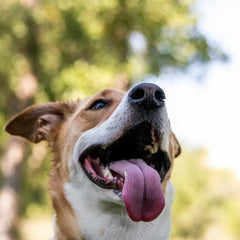Introduction
Eggs have long been considered a nutritional powerhouse for humans, packed with essential proteins, vitamins, and minerals. But, as dog owners, we often wonder if what's good for us is good for our furry friends. "Can my dog eat eggs?" is a question that merits exploration. This article seeks to unravel the intricacies of eggs in a dog's diet, helping owners make informed decisions.
A Protein-Packed Snack or a Salmonella Risk?
At a glance, eggs seem like the ideal treat for dogs. They're rich in essential nutrients and easily available. But are they entirely risk-free?
Benefits of Eggs for Dogs:
- High-Quality Protein: Eggs offer a fantastic protein source, essential for muscle development and repair.
- Rich in Vitamins: Eggs are packed with vitamins A, B, D, and E, supporting overall health.
- Essential Fatty Acids: These are great for skin and coat health.
- Amino Acids: Eggs contain all the essential amino acids required by dogs.
However, the raw truth about eggs also brings up the concern of Salmonella, a bacteria that can be present in uncooked eggs.
Potential Risks of Eggs
While eggs can be a nutritious addition to a dog's diet, potential risks should not be overlooked.
- Salmonella: Raw eggs can carry Salmonella, which can infect dogs and lead to symptoms like vomiting, fever, and enlarged lymph nodes.
- Biotin Deficiency: Raw egg whites contain avidin, a protein that can interfere with the absorption of biotin, a B vitamin. While this is rare, excessive consumption of raw egg whites can lead to a deficiency.
- Allergies: Some dogs might be allergic to eggs, exhibiting symptoms like itching or gastrointestinal upset.

How to Safely Feed Eggs to Dogs
With the potential benefits and risks in mind, if you choose to introduce eggs to your dog's diet, it's crucial to do so safely.
Feeding Guidelines:
- Cooked Over Raw: To minimize the risk of Salmonella, always offer your dog cooked eggs. Whether boiled, scrambled, or poached, ensure they're fully cooked.
- Avoid Seasonings: If cooking eggs, ensure they're free from added seasonings, oils, or butter.
- Whole Egg is Best: The yolk contains most of the egg's nutrients, while the white has the protein. Feeding the whole egg ensures your dog gets all the benefits.
- Moderation is Key: While eggs are nutritious, they should complement a balanced diet, not replace it. Depending on your dog's size, 1-3 eggs a week is a general guideline.
FAQs: Unscrambling the Egg Enigma
1. Can puppies eat eggs?
Yes, puppies can safely consume eggs. They offer essential proteins and amino acids vital for growth. However, ensure they're cooked and introduced gradually.
2. How often should I feed my dog eggs?
For most dogs, 1-3 eggs per week is sufficient. Always observe your dog for any adverse reactions and consult with a veterinarian about dietary changes.
3. Are eggshells safe for dogs?
Eggshells, when finely ground, can be a source of calcium. However, ensure they're clean and free from any potential contaminants.
4. What should I do if my dog shows signs of an egg allergy?
Discontinue egg feeding immediately and consult with a veterinarian. Symptoms might include skin irritations, itching, or gastrointestinal issues.
5. Can I give my dog commercial foods containing egg products?
Yes, many high-quality dog foods contain egg products as a protein source. Always choose reputable brands and ensure the food meets your dog's nutritional needs.
Conclusion
Eggs can be a delightful and nutritious addition to a dog's diet when offered correctly. By understanding their potential benefits and risks, dog owners can make informed decisions, ensuring their furry friends get a varied and balanced diet. As always, the well-being of our pets remains paramount, and understanding their dietary needs is a significant aspect of their overall health.




